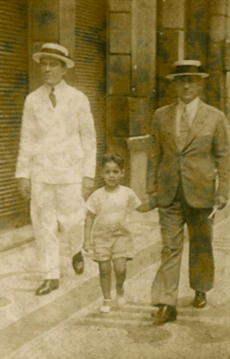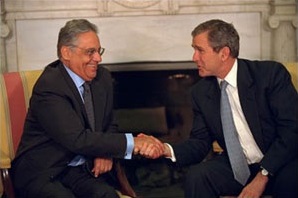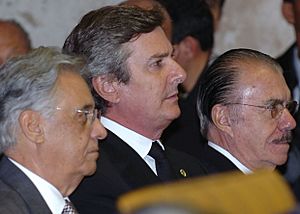Fernando Henrique Cardoso facts for kids
Quick facts for kids
Fernando Henrique Cardoso
|
|
|---|---|
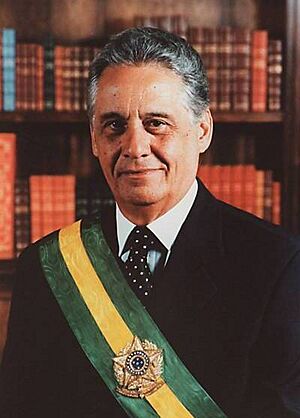
Official portrait, 1999
|
|
| 34th President of Brazil | |
| In office 1 January 1995 – 1 January 2003 |
|
| Vice President | Marco Maciel |
| Preceded by | Itamar Franco |
| Succeeded by | Luiz Inácio Lula da Silva |
| Senator for São Paulo | |
| In office 4 April 1994 – 15 December 1994 |
|
| Preceded by | Eva Blay |
| Succeeded by | Eva Blay |
| In office 15 March 1983 – 5 October 1992 |
|
| Preceded by | Franco Montoro |
| Succeeded by | Eva Blay |
| Minister of Finance | |
| In office 19 May 1993 – 30 March 1994 |
|
| President | Itamar Franco |
| Preceded by | Eliseu Resende |
| Succeeded by | Rubens Ricupero |
| Minister of Foreign Affairs | |
| In office 2 October 1992 – 20 May 1993 |
|
| President | Itamar Franco |
| Preceded by | Celso Lafer |
| Succeeded by | Celso Amorim |
| Personal details | |
| Born | 18 June 1931 Rio de Janeiro, Federal District, Brazil |
| Political party | PSDB (1988–present) |
| Other political affiliations |
MDB (1974–1980) PMDB (1980–1988) |
| Spouses | |
| Children | 3 |
| Relatives | Pedro Cardoso (cousin) |
| Residences | São Paulo, São Paulo, Brazil |
| Alma mater | University of São Paulo (PhD) |
| Profession | Sociologist |
| Signature |  |
| Website | http://www.ifhc.org.br/ |
Fernando Henrique Cardoso (born 18 June 1931), also known by his initials FHC, is a Brazilian sociologist, professor, and politician. He served as the 34th president of Brazil from 1995 to 2003. He was the first president in Brazil's history to be elected for a second term in a row.
Before becoming president, Cardoso was a famous scholar. He was known for his studies on how countries develop and relate to each other. For his work, he has won many awards, including the Kluge Prize from the U.S. Library of Congress in 2012. As president, he is best known for controlling Brazil's high inflation and making the country's economy more stable.
After his presidency, Cardoso started the Fernando Henrique Cardoso Foundation. He also works with many international groups, like the Clinton Global Initiative and the United Nations Foundation. He is a member of a group of world leaders called The Elders, who work for peace and human rights.
Contents
Early Life and Education
Fernando Henrique Cardoso was born in Rio de Janeiro but spent most of his life in São Paulo. His family included some politicians who were active during the Empire of Brazil.
He studied to be a sociologist, which is a person who studies how people live and work together in society. He earned his bachelor's, master's, and doctorate degrees from the Universidade de São Paulo. His studies focused on Brazilian history and society.
Cardoso became a professor of political science and sociology. He taught at many famous universities around the world, including in France, the United Kingdom, and the United States. He is fluent in Portuguese, English, French, and Spanish.
From 1953 until her death in 2008, he was married to Ruth Cardoso, an anthropologist. They had three children together.
Path to the Presidency
Cardoso became involved in politics during a time when Brazil was moving back to a democratic government. In 1982, he was elected as a Senator for the state of São Paulo.
In 1988, he helped create a new political party, the Brazilian Social Democratic Party (PSDB). As a senator, he helped write Brazil's current Constitution, which was approved in 1988.
Before running for president, Cardoso served in two important government roles. He was the Minister of Foreign Affairs from 1992 to 1993. Then, he became the Minister of Finance. As Finance Minister, he created a successful economic plan called the Plano Real. This plan introduced a new currency, the real, and helped stop the country's problem with rapidly rising prices (inflation).
The success of the Plano Real made him very popular. He ran for president in 1994 and won with 54% of the vote. This was the largest victory margin in a free election in Brazil's history.
Presidency of Brazil (1995–2003)
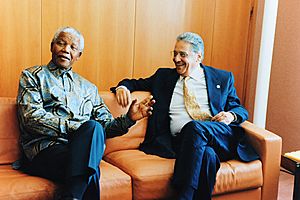
Cardoso became president on January 1, 1995. His government continued to work on making Brazil's economy stronger and more open to the world.
First Term (1995–1998)
During his first term, Cardoso's main goal was to keep inflation low and continue the economic stability started by the Plano Real. His government also sold some state-owned companies to private businesses. This process is called privatization. Major companies in the telephone and mining industries were sold.
His government also passed new laws to improve how the government worked. One important change to the constitution allowed a president to be reelected for a second term. In 1998, Cardoso ran for reelection and won easily, becoming the first president to do so.
Second Term (1999–2003)
Cardoso's second term was more challenging. Brazil faced economic problems, including a drop in the value of its currency, the real. There was also an energy crisis caused by a lack of rain, since much of Brazil's electricity comes from hydropower. These issues made him less popular.
During his presidency, Cardoso also focused on social issues. He started programs to help poor families, such as the Bolsa Escola, which gave money to families who kept their children in school. His wife, Ruth Cardoso, led efforts to combine these programs to better help people in need.
Cardoso was a respected leader on the world stage. He built good relationships with other world leaders like U.S. President Bill Clinton. On January 1, 2003, he left office and was succeeded by Luiz Inácio Lula da Silva.
Life After the Presidency
After leaving office, Cardoso has remained an important voice in Brazilian politics. He writes articles for newspapers and gives lectures about politics and the economy.
He founded the Fernando Henrique Cardoso Institute in São Paulo. The institute works on projects related to democracy and development. He also teaches at universities like Brown University in the United States and Sciences Po in Paris.
Cardoso is involved in many international groups. He is a member of the Club of Madrid, a group of former democratic presidents and prime ministers. He is also a member of The Elders, a group of global leaders founded by Nelson Mandela to promote peace and human rights.
In 2013, he was elected to the Brazilian Academy of Letters, an honor that recognized his achievements as a writer and scholar.
Images for kids
-
Cardoso with Russian President Vladimir Putin in Moscow in January 2002.
-
Outgoing president Cardoso, with his wife Ruth (right), at the inauguration of Luiz Inácio Lula da Silva on 1 January 2003.
-
Cardoso speaks at the National Congress of Brazil during a ceremony for the 15th anniversary of the Plano Real in July 2009.
-
Former President Cardoso and then-President of Argentina Cristina Kirchner in Buenos Aires, 3 December 2009.
See also
 In Spanish: Fernando Henrique Cardoso para niños
In Spanish: Fernando Henrique Cardoso para niños
 | Bessie Coleman |
 | Spann Watson |
 | Jill E. Brown |
 | Sherman W. White |


